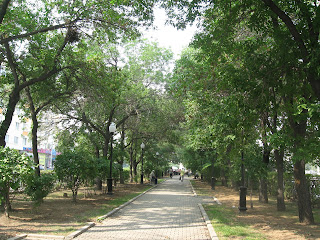
Something old ... a Russian samovar
Something new...
I'm home from Russia, and a news story from there depressed me greatly. New York Times reporter Clifford Levy reported Russia Uses Microsoft to Suppress Dissent.
In one sense the story wasn't new to me. Levy's piece wasn't the first detailing the cynical way that Russian authorities have used anti-piracy laws as a pretext for confiscating computers of troublesome non-governmental organizations. Although software piracy is rampant in Russia, and Microsoft estimates that it loses $1 billion a year because of piracy, authorities have not gone after the manufacturers or distributors of pirated goods. Dozens of raids have instead been made on advocacy groups and opposition newspapers, totally disrupting their operations.
Clifford Levy didn't report on the reaction of ordinary Russians to the police raid of the environmental group Baikal Wave. Here's what I think Ivan Ivanovich (that's "Joe Blow," in Russian) might say.
"Let's be realistic here," says Ivan Ivanovich. "The law is nothing more than a tool for authorities to use as they wish. If you irritate the people in power, or you have something they want, well, expect them to use the law against you. They certainly won't use the law against their friends!"
To Ivan Ivanovich there's nothing surprising about the authorities using anti-piracy law to go after Baikal Wave. The organization opposed the re-opening of a paper mill on the shore of beautiful Lake Baikal, the world's oldest and deepest lake, home to hundreds of species found nowhere else. But Vladimir Putin had taken a stance in favor of reopening the dirty factory. (Putin had publicly made his endorsement after taking a submarine ride in the lake. The pure waters could handle pollution from the plant, he concluded.)
What made this story different from dozens of others about anti-piracy raids on advocacy groups is that the New York Times reporter focused on the role of an American entity. "Microsoft, like many American technology giants doing business in authoritarian countries is often faced with ethical choices over government directives to help suppress dissent."
Microsoft had tried to steer a middle way. It would cooperate with the Russian government on anti-piracy crack-downs, but it would try to help non-governmental organizations by making licensed software free or very low cost. All an NGO had to do was ask for the free licensed software.
Indeed, Baikal Wave had licensed software. But where standards of probable cause are weak, and judges are complicit, the little guy has little protection. Baikal Wave had its computers confiscated "for investigation."
Clifford Levy's story upset me so much I tried to think about something I could do. I thought about contacting a friend in the U.S. Department of State... would the U.S. government have any influence? Erratic enforcement of anti-piracy laws are one of the things holding up Russia's accession to WTO, the World Trade Organization. But I happen to believe that Russian leaders aren't all that enthusiastic about WTO because of the disruptions it would bring to protectionist policies... Diplomatic pressure would probably not work.
Is there a higher power than the U.S. government? Yes. The power of the U.S. press.
There was some squirming on office chairs in Redmond, Washington, after the story in the New York Times on Monday. Microsoft had known for months of accusations that "Russia uses Microsoft to suppress dissent." But in just one day, on Tuesday, Microsoft came up with what appears to me to be a brilliant remedy. Microsoft general counsel Brad Smith announced Microsoft Changes Policy Over Russian Crackdown. The company will immediately provide a blanket software license good until 2012 to cover even pirated software installed by advocacy groups and media outlets. NGOs will be automatically covered by it, without having to apply. Furthermore, Microsoft will institute the same policy in any other country where advocacy groups are threatened with shutdown by the same tactic as has been used in Russia.
See, some stories have happy endings!
































